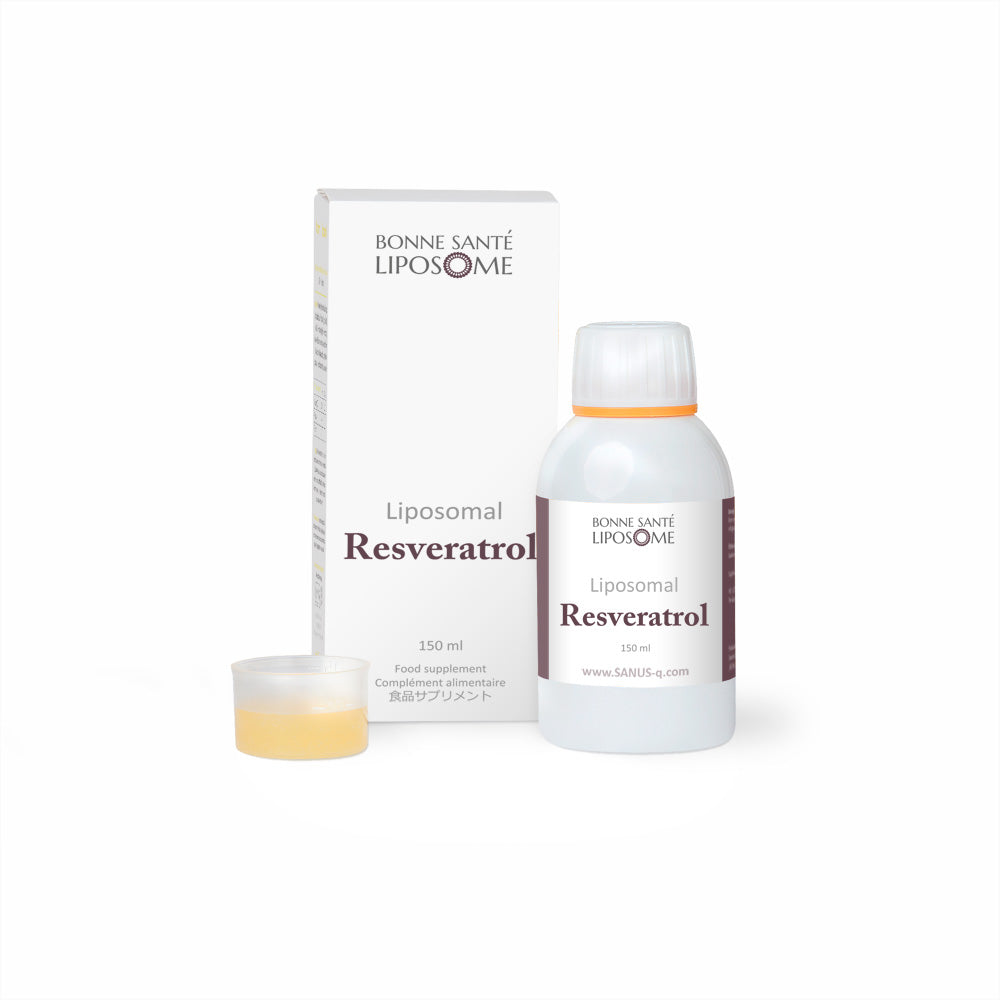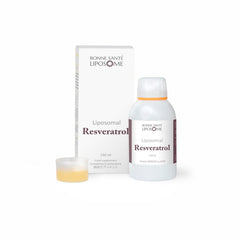Bonne Santé Liposome: Liposomal Resveratrol - 150ml
Liposomal Resveratrol for Anti-ageing and heart health
Current batch best before date: Product discontinued
(Check our current promotions before buying)
Contains: (per 5 ml) 200 mg Resveratrol
Suggested dosage: 1 x 5 ml directly in mouth or glass of water or juice, unless otherwise advised by a healthcare professional. Do not exceed recommended dosage.
Ingredients: Resveratrol; lecithin (Non-GMO SOY) - emulsifier; glycerol - humectant; ethanol <4.2%; natural vitamin E (as d-alpha tocopherol) - antioxidant; potassium sorbate - preservative; purified water.
Recommended serving size: 5 ml
Servings per bottle: 30
Storage: Store cool and dry. When opened store in refrigerator and finish within 2 months.
Product description PDF: View Here
Product Description
- 150 ml Resveratrol
- Liposomal resveratrol for better absorption and bio-availability
- Non-GMO product
- Measuring cup included
- Resealable screw top lid
Resveratrol Health Benefits
- Antioxidant and anti-inflammatory
- Anti-aging
- Maintains brain health, reduces risk of neurodegenerative diseases
- Supports cardiovascular health
- Helps in managing type 2 diabetes
Why do you need Resveratrol?
Resveratrol is a natural compound found in the skin of red grapes. It is also found in berries, peanuts, green tea and chocolate. Plants make this antioxidant compound in response to injury, fungal infection or UV exposure. It also helps plants to survive extreme environmental conditions such as a shortage of nutrients.
Recent studies show that resveratrol can be used to treat many diseases, especially cardiovascular diseases, diabetes, neuro-degenerative disorders and many inflammatory conditions. This is due to its powerful antioxidant and anti-inflammatory effects. Resveratrol is also believed to work in the same way as calorie restriction to bring anti-aging benefits and to help you keep your overall health.
1. Anti-aging benefits
Prominent theories on aging suggest that oxidative damage and poor mitochondrial functions could be the main underlying factors in the aging process. Resveratrol appears to improve both these parameters.
As a powerful antioxidant and anti-inflammatory, resveratrol protects cells and tissues from oxidative damage.
Resveratrol is also known to activate SIRT1, a member of the Sirtuin family, and closely associated with longevity. Sirtuins are a class of enzymes that control many cellular processes that are related to aging, for example energy metabolism, cellular response to oxidative stress, inflammation, DNA repair and mitochondrial functions. As we age, all of these cellular processes become less efficient – causing more oxidative stress than your body can cope with. This in turn leads to increased inflammation, impaired mitochondrial functions and faults in DNA repair.
Resveratrol increases the number and functions of mitochondria, the small units within every cell that produce energy.
2. Heart health
Again, it is the anti-oxidant and anti-inflammatory properties of resveratrol that support your heart health. Resveratrol lowers various risk factors for cardiovascular diseases.
- Reduces oxidative stress and inflammation
- Prevents oxidation of LDL cholesterol in the blood vessels, reducing the risk of atherosclerosis (plaque formation in arteries)
- Lowers blood pressure by increasing NO production. NO dilates the blood vessels and improves the flow of blood to the heart, brain and other tissues.
- Prevents platelets from sticking to each other, reducing the risk of blood clots. The formation of blood clots increases the risk of angina, heart attack and even stroke.
3. Brain health
Studies show that resveratrol may help maintain brain health during aging. It may even slow down cognitive decline in patients with Alzheimer’s disease. While its antioxidant and anti-inflammatory properties play a huge role, resveratrol may also support brain health and reduce the risk of neurogenerative disorders through other mechanisms.
Studies point out the resveratrol may even plug a leaky blood-brain-barrier (BBB) in Alzheimer’s patients. This prevents toxic molecules from entering the brain tissue and triggering inflammation. Resveratrol may also induce immune responses that help in destroying and clearing away amyloid beta (Aβ) proteins, known to cause oxidative stress and inflammation in the brain. [1] Both inflammation and deposition of amyloid beta proteins are considered major risk factors in the development of Alzheimer’s. [2]
Resveratrol supplements may also help to preserve cognitive functions in people with type 2 diabetes. High blood sugar levels damage blood vessels, leading to reduced supply of blood to the brain. This increases the risk of dementia. Resveratrol appears to dilate the cerebral blood vessels, which in turn increases blood flow to the brain. [3]
In a nutshell, resveratrol may support brain health in many ways:
- Reduces inflammation in the brain
- Improves blood flow to the brain
- Crosses blood-brain barrier (BBB) and also restores the integrity of a leaky BBB
- Helps in clearance of amyloid beta proteins
4. Types 2 Diabetes
Resveratrol supplements may be helpful in managing type 2 diabetes. Research shows resveratrol lowers blood glucose levels and insulin resistance. [4] [5] It also lowers the risk of obesity, a major risk factor for type 2 diabetes.
In some small-scale human studies, resveratrol supplements have been found to improve arterial stiffness and reduce oxidative stress in patients with type 2 diabetes. While it is common to have stiff arteries in old age, high glucose levels in the blood cause more damage to the vessels, leading to untimely thickening of the arteries. Arterial stiffness increases the risk of high blood pressure, heart attack and stroke. [6] [7]
Studies show that there is more to resveratrol than its antioxidant and anti-inflammatory properties. Resveratrol activates Sirtuin 1, which plays a big role in improving insulin sensitivity. In addition, it also activates AMPK, a protein that helps the body use fat and glucose. Activated AMPK promotes uptake of glucose by cells and improves insulin sensitivity.
Bonne Sante Liposome Resveratrol
Resveratrol offers many health benefits, but it is limited by poor absorption in the body. Liposomal technology makes this powerful antioxidant compound more available to the cells, improving the uptake and absorption.
Precautions and warnings
Always consult your health care provider before taking any dietary supplements. While resveratrol is usually safe, it is not recommended for:
- Women with cancer in breast, ovary or uterus
- Women who are trying to conceive
- People on blood-thinning drugs such as aspirin, ibuprofen and warfarin.
References:
- Moussa et al. Resveratrol regulates neuro-inflammation and induces adaptive immunity in Alzheimer’s disease. Journal of Neuroinflammation 2017
- Wong et al. Low dose resveratrol improves cerebrovascular function in type 2 diabetes mellitus. Nutrition Metabolism & Cardiovascular Diseases. 2016.
- Jia et al. Resveratrol and Amyloid-Beta: Mechanistic Insights. Nutrients 2017
- Zhu et al. Effects of resveratrol on glucose control and insulin sensitivity in subjects with type 2 diabetes: systematic review and meta-analysis. Nutr Metab (Lond). 2017
- Liu et al. Effect of resveratrol on glucose control and insulin sensitivity: a meta-analysis of 11 randomized controlled trials. Am J Clin Nutr. 2014
- Can the antioxidant resveratrol reduce artery stiffness in diabetics? American Heart Association. 2017.
- Imamura et al. Resveratrol Ameliorates Arterial Stiffness Assessed by Cardio-Ankle Vascular Index in Patients With Type 2 Diabetes Mellitus. Int Heart J. 2017




 Pin it
Pin it